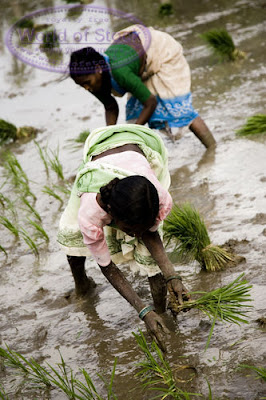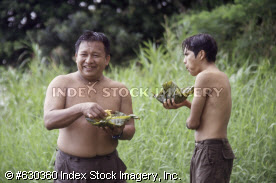 Rice farming, in a span of a few decades, has transformed into a highly commercialized industry. Farmers now have to compete with Multi-National Companies (MNCs), who want a piece of the pie as well. Armed with financial and technological resource, they storm into the rice industry. The presence of machines and high-yielding, high-tech equipment introduced by MNCs has placed rural farmers in marginalized positions. The farmers are unable to compete as they desperately lack the resource and finances, hence leaving them to pick up only the crumbs of the pie. Not to forget, farmers make up a substantial amount of the population in Southeast Asia!
Rice farming, in a span of a few decades, has transformed into a highly commercialized industry. Farmers now have to compete with Multi-National Companies (MNCs), who want a piece of the pie as well. Armed with financial and technological resource, they storm into the rice industry. The presence of machines and high-yielding, high-tech equipment introduced by MNCs has placed rural farmers in marginalized positions. The farmers are unable to compete as they desperately lack the resource and finances, hence leaving them to pick up only the crumbs of the pie. Not to forget, farmers make up a substantial amount of the population in Southeast Asia!In lieu of this serious problem, governments have tried to ensure a minimum income for farmers in the form of subsidies. High-yielding rice grains and chemicals are provided at a lower cost and machines are available for rent at affordable rates. This ensures a minimum income for farmers and aide them in improving productivity. However, critics have pointed out those subsidies in turn cushion inefficiency in farmers and conflict with the fiscal balance of the country. Giving subsidies to rice farmers could also result in other industries lobbying for the same benefits, resulting in social unrest.
For example in Thailand, the previous government set the price of rice to 30 % above the market rate. However, this drew a criticism from the former Deputy Prime Minister and Finance Minister Pridiyathorn Devakula. He criticized the previous government for implementing populist policies which resulted in widespread social problems.
He added, “…It has become a burden on government's fiscal responsibility. Rice would be pledged for the current market price.”
Commerce Minister Krirk-krai Jirapaet supported this view, saying that the high subsidy would discourage farmers from improving their productivity, thus being a burden to the state.
 Yet it is unfair to reduce all subsidies, what would happen to the farmers that really need the help from the government? Previously at the mercy of loan sharks, farmers can now borrow from state-run banks at low interest. But they still have to pay for fertiliser and pesticide. If they are hit by floods or drought, farmers will plunge deeper into debt. Even with a good harvest, many farmers are still at the mercy of the middlemen, who buy from them cheaply. The above-mentioned are just basic problems. Farmers cannot rise above poverty if they cannot control the market. They need technological know-how to boost rice yields, and marketing skills to compete with global traders. What happens if farmers abandon their rice fields and look for other jobs? The country will be in grave danger if we do not help and protect our rice farmers. A large number of rural people have already left their farmland to work in factories. Why do back-breaking work on the farm when they can earn more money sewing shirts or assembling cars?Therefore it is essential that the government have a long-term plan for the future of our rice farmers. To keep them on the farms, the government must ensure that they get a good price for their produce. An insurance scheme should also help them cope with natural disasters.
Yet it is unfair to reduce all subsidies, what would happen to the farmers that really need the help from the government? Previously at the mercy of loan sharks, farmers can now borrow from state-run banks at low interest. But they still have to pay for fertiliser and pesticide. If they are hit by floods or drought, farmers will plunge deeper into debt. Even with a good harvest, many farmers are still at the mercy of the middlemen, who buy from them cheaply. The above-mentioned are just basic problems. Farmers cannot rise above poverty if they cannot control the market. They need technological know-how to boost rice yields, and marketing skills to compete with global traders. What happens if farmers abandon their rice fields and look for other jobs? The country will be in grave danger if we do not help and protect our rice farmers. A large number of rural people have already left their farmland to work in factories. Why do back-breaking work on the farm when they can earn more money sewing shirts or assembling cars?Therefore it is essential that the government have a long-term plan for the future of our rice farmers. To keep them on the farms, the government must ensure that they get a good price for their produce. An insurance scheme should also help them cope with natural disasters.
4 comments:
Hi there,
An insightful analysis of the rice trade in SEA, the problems they face and many other issues.
Any ideas for the government to improve the situation?
after reading this post, i feel guilty about not finishing every grain of rice on my plate all the times. indeed, rice is such a highly demanded commodity, yet the plight of these rice farmers are rife.
-hy
Hi,
Thanks for the comment. I feel that despite the current decline in rice consumption in SEA, the need for rice will always be emminent. And it will continue to play a pivotal role in culture, tradition and consumption.
Hence what the government can do is to continue to improve this demand by preserving its culture. As for the farmers, subsidies could be provided. Not to the extent of pampering the farmers, but sufficient to allow them to lead a comfortable life while cultivating rice. Farmers' rights have to be protected as they play a huge part in the nation's social and economic status.
An interesting perspective would be to use organic farming. You can find out more at : http://www.grain.org/g/?id=36
Regards,
colin
Hi,
Just to share my two cents.
Colin, while the idea of government subsidies will be of great help to farmers, this unfortunately cannot happen today. The only countries who appear to get away with agricultural subsidies are established industrialized nations such as US and Europe.
The issue of farm subsidies has been very contentious in the WTO debates. There are several sides to this coin of course and I believe you'll be much rewarded when you explore the issue of subsidies.
In addition developing countries may find the burden of providing subsidies (direct or otherwise) to be to great to bear. One possible manner to improve the lot of rice farmers is creating a regional rice agency that buys the rice from farmers at a decent rate. I believe the Aussies do something like this through their Australian Wheat Board (AWB). All wheat producers in Australia must sell their wheat to AWB who monopolizes the export market. However, this itself can be fraught with problems, what more for a regional or pan-regional organization.
Post a Comment